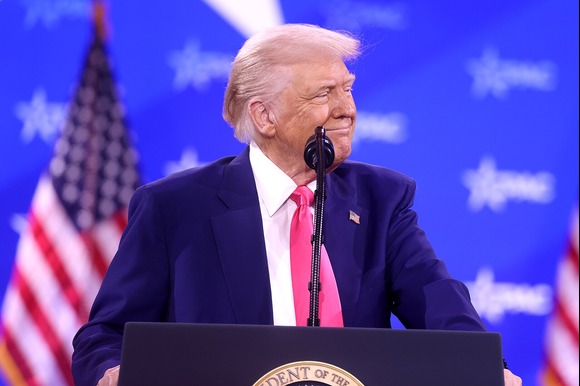Some conservative members of Donald Trump’s “Make America Great Again” (MAGA) movement have reacted with outrage over the president’s decision to sell weapons to NATO, viewing it as a betrayal of his longstanding promise to end U.S. involvement in foreign wars.
On Monday, Trump announced that his administration would facilitate the transfer of American-made weapons to Ukraine via NATO. Simultaneously, he warned that Russia would face additional tariffs if a peace deal to end the war is not reached within 50 days.
The decision sparked backlash from within Trump’s own political camp. Republican Congresswoman Marjorie Taylor Greene—a vocal Trump supporter and prominent isolationist—along with former Trump strategist Steve Bannon, criticized the move. Speaking on his War Room podcast, Bannon dismissed the conflict in Ukraine as “a European war” and said it should be Europe’s responsibility to manage it.
The White House responded by stressing that the weapons would not be given as direct U.S. aid, but rather sold to European nations. In an interview with The New York Times, Greene expressed frustration with the administration’s position, calling it inconsistent with the promises she and Trump made to voters.
“It’s not just Ukraine; it’s all foreign wars in general and a lot of foreign aid,” Greene said. “This is what we campaigned on. This is what I promised also to my district. This is what everybody voted for. And I believe we have to maintain the course.”
Trump attempted to downplay concerns over costs to U.S. taxpayers by clarifying, “We’re not buying it, but we will manufacture it, and they’re going to be paying for it.”
However, in a rare public break with the president, Greene expressed skepticism that Americans would avoid footing the bill. She criticized what she called “backdoor deals through NATO” and suggested that indirect costs—such as training programs and broader NATO funding—still represented U.S. involvement.
“Without a shadow of a doubt, our tax dollars are being used,” she told The New York Times. “I said it on every rally stage: no more money to Ukraine. We want peace. We just want peace for those people. And guess what? People haven’t changed.”
An anonymous former Trump campaign official told Politico that while Europe’s role in purchasing the weapons somewhat reduced the backlash, it hadn’t eliminated it.
“But we still hate it,” the official said. “This is not our war, and escalation isn’t in America’s interest.”
Bannon echoed these sentiments in his podcast, describing the situation in Ukraine as “so dangerous.” He argued that Europe has both the resources and manpower to handle the conflict on its own. “We’re about to arm people we have literally no control over,” Bannon warned. “This is old-fashioned, grinding war in the bloodlands of Europe—and we’re being dragged into it.”
In response, White House Deputy Press Secretary Anna Kelly dismissed concerns of deep division within the MAGA base, telling Politico that Trump’s supporters “aren’t panicans like the media” and that “they trust in Trump, and they know that this president is restoring peace through strength.”
A separate White House official, also speaking anonymously, disagreed that the president’s base was united in opposition. The official pointed to a recent poll showing that nearly two-thirds of Trump voters support continuing arms deliveries to Ukraine.
Within the administration, officials have also defended Trump’s move. Under Secretary of Defense Elbridge Colby wrote on X (formerly Twitter) that Trump’s “America First” message demands alliances be “fair and equitable.”
“This is eminently reasonable but was treated for many years as heresy,” Colby wrote. “Yet now with the historic NATO commitment we see that it can work.”
That recent NATO pledge—where member nations agreed to boost their defense spending to 5% of economic output—won praise from several Trump supporters. They argued that the arms deal is justified by Europe now taking greater responsibility for its own defense.
Speaking just hours after meeting NATO Secretary General Mark Rutte at the White House, Trump said the alliance was finally “paying its own bills.”
He reaffirmed support for NATO’s collective defense principle and said he remained hopeful but realistic about the war in Ukraine. Referring to Russian President Vladimir Putin, Trump said he was “disappointed but not done,” noting he had believed on four occasions that a peace deal was imminent.
The president’s latest moves come at a sensitive political moment, as he attempts to balance foreign policy decisions with the expectations of a deeply loyal yet sharply divided political base.






